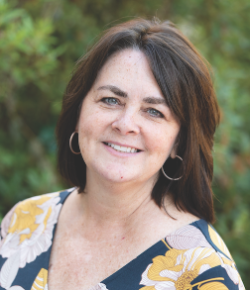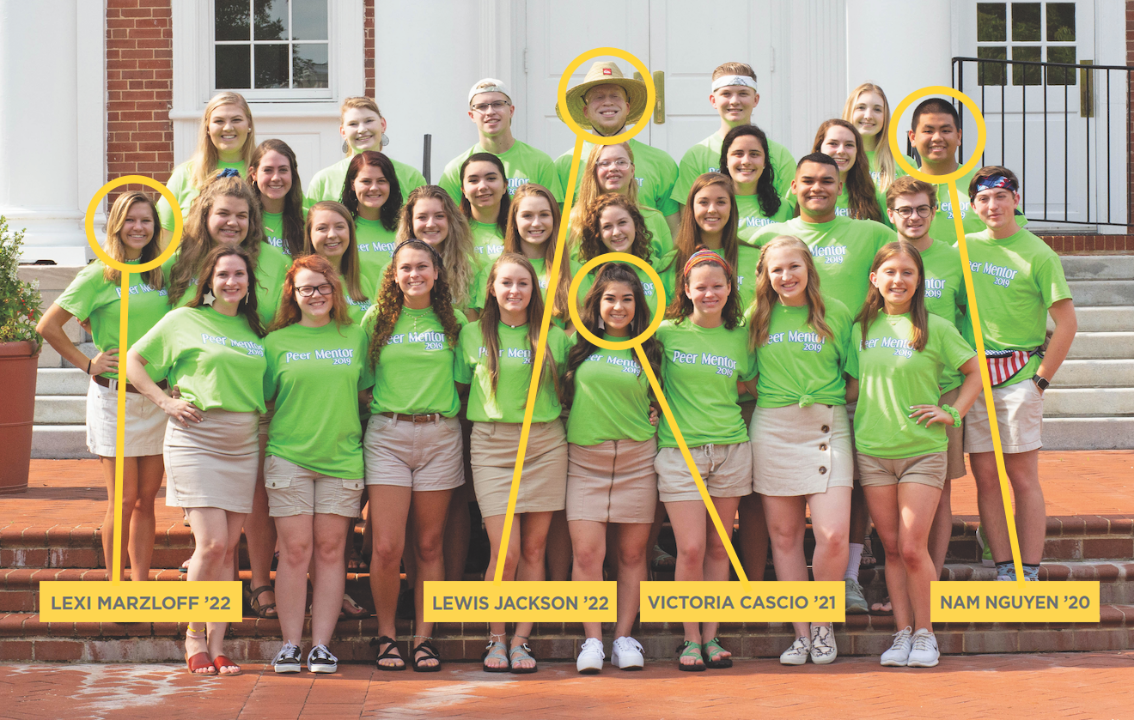SOME OF THE BEST mentors at Longwood are just a year or two older than the new students they’re helping adjust to college life. But that year or two makes all the difference.
For peer mentors, their own freshman year— and the lessons they learned from it—are barely in the rearview. They remember exactly what it’s like to move away from everything and everyone you know and, on top of that, tackle more challenging academic work and make new friends.
This is what gives credibility to the dose of gentle encouragement or tough reality peer mentors empathetically hand out to mentees who may be struggling.
Take peer mentor Lewis Jackson ’22 and a young man he’s been assigned to mentor.
“He struggles a little bit academically,” said Jackson, “so we met at Starbucks to talk about it.” Jackson gave it to him straight: “I told him I live by this motto: You can’t expect a 4.0 GPA when you give a 2.0 effort. Then I said, ‘First let’s assess what you’re not doing. Are you going to class? Are you paying attention in class? Are you going to office hours? Are you going to tutoring?’ Of course, he’s like, ‘No.’ Then I told him there are people here in his corner ready to help him.
“I feel that he’s taking some of the first steps. I’ve seen him walking and talking with his professors,” said Jackson, a liberal studies major who wants to be an educator.
Peer mentors give new students—primarily freshmen—the tools and the knowledge they need to be successful.
CAROLINE GIBBS, STUDENT SUCCESS PROGRAM COORDINATOR Tweet This

This kind of student-to-student guidance is exactly what the program is aiming for, said Caroline Gibbs, student success program coordinator, who runs the program.
“Peer mentors give new students—primarily freshmen—the tools and the knowledge they need to be successful. So many students have a hard time adjusting, especially during those first one or two weeks,” she said. “Once we assign them that peer mentor, they have a friend.”
Peer mentors are part of the coaching group system at Longwood. New students are divided into groups based on a shared interest or a theme—fitness, Longwood traditions or civic engagement, for example—and are assigned a coach, usually a staff member, and a peer mentor.
Being a peer mentor is a paid position, and candidates go through a rigorous selection process. Those who make it through the application phase then go through a full day of exercises where they are divided into small teams and observed and evaluated by faculty and staff volunteers. Finally, a committee reviews each candidate’s application and performance. The 65 peer mentors selected to work this summer and fall were chosen from a pool of 125 applicants.
“What we’re looking for is someone who is well-rounded. We’re not necessarily looking for that take-charge person or that cheerleader,” said Gibbs. “Some of our students are introverts and wouldn’t feel comfortable with that kind of mentor. We’re looking for that person who is going to shine regardless of the situation.”
How do you find that kind of person? Not necessarily in the way you might think.
Gibbs’ team has developed several exercises that bring out a candidates’ true colors. One involves taping a grid on the floor, placing obstacles on the grid, asking the applicant to close and cover their eyes, and then making it the responsibility of the rest of the team to get the candidate through the grid without knocking over an obstacle or stepping on a line.
“It’s hilarious to watch,” said Gibbs. “But it really does reveal a lot about your ability to work with a group to make things happen.”
Peer mentor Lexi Marzloff ’22, a business administration major, is proof that the selection process works.
Marzloff applied to be a peer mentor because a group of her friends were doing it—and then was the only one who made it past the application stage. “I was extremely shocked,” she said. “I never thought they’d choose me.”
She may have surprised herself—but certainly not the selection committee—in becoming an outstanding peer mentor.
Marzloff recalls one young woman in her coaching group feeling isolated and left out at the beginning of the year. “At our first meeting, this girl was sitting off to herself and not talking to anyone. I asked her if she was doing OK, and she said, ‘No.’ So I asked her if I could help. She said, ‘Let’s be honest. There’s nothing you can do to help because nobody even knows I’m here.’”
That’s when Marzloff and her coaches went into action, calling some other members of the group over.
“We said, ‘We’re all your friends. You can talk to any of us.’ Then two girls exchanged phone numbers with her. She looked so happy. In the next week’s meeting, she was initiating conversations and really participating. She hangs out with her friends now, and she’s gotten more involved. It’s great to see that.”
Peer mentors revel in being a role model and helping fellow students.
“I understand the challenges college can bring, especially during the first year or so,” said Jackson. “I want to show [new students] you can experience everything you need to experience here without overindulging yourself or forgetting why you’re here.”
Gaining skills and confidence from being a peer mentor is a bonus.
Nam Nguyen ’20, a math major who moved to the United States from Vietnam when he was 12, said being a peer mentor has given him the confidence to speak before large groups of people—a big change.
“It’s mind-blowing how the ‘freshman-year me’ would not have been able to do that, but the ‘me’ now could do that easily,” he said.
Victoria Cascio ’21 said being a peer mentor has boosted her personal confidence and communication skills. “I have gained experience leading, teaching and making presentations,” said the English major, who wants to teach high school. “It’s definitely a resume builder that will help me in my future.”



Leave a Comment